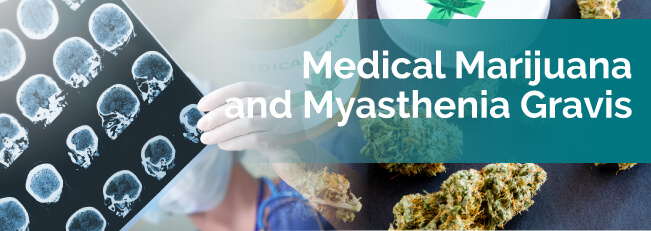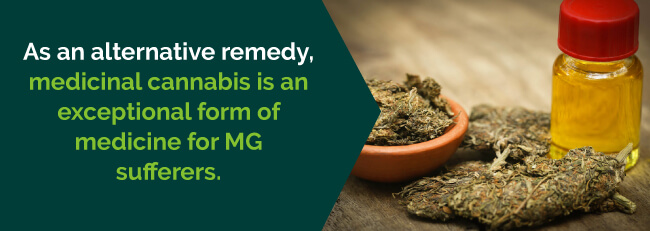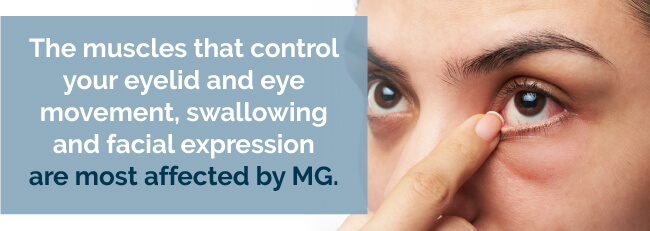
With public viewpoint in the United States changing positively regarding the use of medical cannabis, researchers are studying how this controlled and regulated drug can work for treating a variety of diseases. In particular, one disease being studied now is myasthenia gravis (MG). Researchers are finding marijuana for myasthenia gravis is useful to treat a wide range of symptoms that come with the disease.
As an alternative remedy, medicinal cannabis is an exceptional form of medicine for MG sufferers. Marijuana’s active ingredients can lead to decreased feelings of stress and anxiety and even chronic pain. Medical marijuana also allows the patient’s muscles to relax and function in an appropriate and operational manner.
Find A Doctor Find A Dispensary

Side effects of medical cannabis for myasthenia gravis are mild and may include:
Medical weed, like anticholinesterase agents, can inhibit acetylcholinesterase, the enzyme that’s responsible for acetylcholine degradation. By hindering acetylcholinesterase, there’s more time for acetylcholine to interact with its receptor before its turnover or breakdown. This can help overcome the blocked receptor that causes muscle contractions.
Multiple cannabinoids have been shown to be effective at increasing the levels of acetylcholine and slowing the turnover of acetylcholine. One study published in Molecular Pharmaceutics found that THC, the primary cannabinoid in pot, hindered acetylcholinesterase completely and raised the neurotransmitter levels. Other studies reported by Lycæum showed CBD’s and THC’s effectiveness at reducing the turnover rate of acetylcholine.
The pharmacological effects of CBDs are due to their CBD receptor activation. The effects of CBDs on neurotransmitter transporters and enzymes appear to be caused by a mechanism other than CBD receptor activation — however, researchers don’t completely understand the exact method yet.
MG causes severe weakness in a variety of body parts. It can be a more generalized or localized disease that causes rapid fatigue and weakness.
Prevents myasthenia crisis.Cannabis can help with the severe form of MG, known as myasthenia crisis. It relaxes your muscles, so you’re able to avoid an overexertion-related myasthenia crisis.
Treats pain and stress.Marijuana also relieves the stress and pain the condition causes and how they exacerbate MG. Marijuana dispensaries sell edibles and concentrates to avoid stressing the respiratory system. You don’t have to inhale them for MG treatment. It also makes it possible for you to use the treatment more discreetly.
Helps with depression symptoms.Many people who are suffering from a chronic medical disease develop depression, which can be extremely debilitating, keeping you from reaching out to those you need the most for help.
Symptoms of depression may include:
Since your body and mind are closely connected, depression can worsen your MG. It’s important to work at overcoming your depression to improve your overall quality of life and health.
Helps improve speech.A dose of THC-A cannabis can lead to rapid improvement in speech for MG sufferers.
Helps wean usage of other medications. Cannabis oil helps you deal with the symptoms of autoimmune diseases. After trying cannabis oil, one patient was able to wean her prednisone medication to 5 mg from 10 mg every other day within a few weeks. She experienced no withdrawal symptoms and was able to completely stop using prednisone after two months.
Helps improve quality of life.The same patient noted above was also able to live a good quality of life free of harmful steroid medications and adverse side effects. Cannabis oil also helped the patient’s other body parts, such as her bones, skin, eyes, hormones and PMS pain.
MG is a chronic disease, but it’s manageable. Medical weed is a solution free of side effects for pain and muscle tension related to this condition.
Various cannabis strains help with different MG symptoms like pain, fatigue, stress, muscle tension and depression. Below are only some of the many strains that will provide you with relief from your MG symptoms. Speak to your budtender or medical marijuana doctor about which strain or strains will provide you with the most benefits.
Find these and many other helpful medical marijuana strains to tackle your symptoms of MG and improve your quality of life. Search for a medical marijuana dispensary or doctor to get your prescription.
Find A Doctor Find A Dispensary
MG is an autoimmune disease that makes your muscles weak. Its name was originated from Latin and Greek words that mean “grave muscle weakness.” However, in many cases, the disease isn’t as “grave” as the name suggests, and most patients with MG can live normal lives.
The myasthenia gravis condition results from an insufficient amount of acetylcholine receptors on your postsynaptic membrane. This results in muscle weakness. Both acquired and congenital forms of MG occur in cats, dogs and humans.
MG is a disorder of the space between your muscles and nerves known as the neuromuscular junction. The nerve responds to an electrical signal and releases neurotransmitters crossing this area to activate your muscle movements.
Because MG is an autoimmune disorder, it causes your immune system to attack itself. Because of this, your receptors to acetylcholine neurotransmitters are reduced in function and number. Since your muscle doesn’t receive the appropriate signals when you have MG, you experience weakness in your muscles.
The journal Neuromuscular Disorder, reported by the National Institutes of Health, provides an early timeline of the history of MG. MG was first recognized by a 17th-century Oxford physician named Thomas Willis, who considered it as a distinct clinical entity.
In 1877, a London physician, Samuel Wilks, wrote the first modern description. Around the end of the 19th century, primary diseases of the muscles and diseases caused by muscle denervation were studied by English, German and French physicians.
Samuel Goldflam of Warsaw and Wilhelm Erb of Heidelberg published the first full descriptions of the disorder. Willis’ account and the 19th-century MG literature reveal the influence of German neuropathologists and physicians in the early comprehension of the disease. Doctors described the development of etiology, pathology and therapy of the condition in the first half of the 20th century.
Although MG can affect any skeletal muscle, the muscles that control your eyelid and eye movement, swallowing and facial expression are most affected. The disorder may come on suddenly, and its symptoms are often not recognized immediately as MG.

Often, weakness of your eye muscles is the first noticeable symptom. Sometimes, slurred speech and difficulty swallowing may be the first symptoms to emerge. Each individual is unique in the degree of their muscle weakness in MG, and it can range from ocular myasthenia — localized form limited to the muscles of your eye — to a generalized or severe form where it affects many of your muscles, including the muscles that control your breathing.
While there is currently no cure for MG, treatment can help relieve signs and symptoms, such as:
The disease incidence is usually around three to 30 cases per million per year and continues to rise as a result of increased awareness.
There are factors that can trigger or worsen MG exacerbations, including:
Your physician will arrive at an MG diagnosis through asking you about your symptoms and conducting a physical and neurological exam. Specific tests your doctor may perform include:
Your physician may perform a single fiber electromyography, or EMG, if other tests fail to lead to a myasthenia gravis diagnosis. The EMG is considered to be one of the most sensitive tests for MG and can be beneficial in diagnosing even mild cases of MG.
Although MG complications are treatable, some could be life-threatening.
Complications associated with MG may include:
Around 20 of 100,000 individuals in the U.S. live with MG, according to the Myasthenia Gravis Foundation of America,.

Other MG statistics reported by the National Institute of Neurological Disorders and Stroke (NINDS) reveal that:
You can control your MG symptoms via therapies that help reduce and improve your muscle weakness. These include:
This is a surgery that involves removal of your thymus gland. A thymectomy may reduce your MG symptoms. It may even cure you of the disease symptoms by re-balancing your immune system.
According to a recent study funded by the NINDS, thymectomy is beneficial for individuals with thymoma and individuals who don’t have any evidence of tumors. This clinical trial followed 126 MG patients with no visible thymoma. Results of the trial showed surgery reduced the need for immunosuppressive drugs and reduced muscle weakness.
Since this is a major surgery, there are certain risks to be aware of, including:
You may also experience pain at the incision site and your back. Due to the stress of the surgery and the anesthesia, you may also become temporarily weaker following your operation. Additionally, if you have other medical issues, you could have more complications.
If you have a severe case of MG, these two therapies could be an option. You could have antibodies in your plasma that attack your neuromuscular junction. These two treatments help eliminate the destructive antibodies. However, their results often only last for several weeks to months.
Plasmapheresis is a procedure that uses a machine to get rid of the plasma’s harmful antibodies and replace them with a plasma substitute or healthy plasma.
Common side effects of plasmapheresis and intravenous immunoglobulin may include:
Intravenous immunoglobulin is an injection of highly concentrated antibodies from healthy donors that change how your immune system operates temporarily. It binds to the antibodies that cause MG and eliminates them from circulation.
Common side effects of intravenous immunoglobulin may include:
If you experience any of these symptoms for an extended time or if they get worse, consult with your doctor. You may also experience some redness, swelling and pain at the injection site.
Immunosuppressive drugs suppress abnormal antibody production and improve muscle strength. These drugs may include azathioprine, prednisone, rituximab, tacrolimus and mycophenolate.
Side effects of immunosuppressive drugs vary considerably for the many different immunosuppressant drugs available. Common side effects may include:
These medications include anticholinesterase agents, such as regonol or mestinon, and slow acetylcholine breakdown at the neuromuscular junction, helping increase muscle strength and improve neuromuscular transmission.
Side effects of anticholinesterase medications may include:
You can help alleviate your MG symptoms with a few lifestyle changes, including:
With any of the above treatments, your symptoms should improve. You may even go into remission where you no longer need treatment.